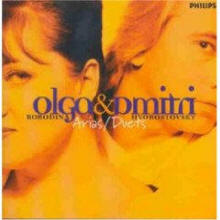|
You are reading the older HTML site
Positive Feedback
ISSUE
"Olga & Dmitri": Arias and Duets
Olga Borodina, mezzo-soprano*; Dmitri Hvorostovsky, baritone+; English Chamber Orchestra/Patrick Summers. Philips 289 454 439-2. TT: 65:50. ROSSINI: Il barbiere di Siviglia: Largo al factotum+; Dunque io son*+; Una voce poco fa*. DONIZETTI: La favorita: Ebben, così si narra!...Quando le soglie paterne*+; Fia dunque vero...O mio Fernando*; Ma de' malvagi invan...Vien, Leonora+. RIMSKY-KORSAKOV: The Tsar's Bride: Zachem ty! Znat' nye lyubish*+; Vor da chevo ya dashla+; S uma neydot krasavitsa+. SAINT-SAËNS: Samson et Dalila: J'ai gravi la montagne*+. It shouldn't surprise anyone that the Russian and French selections fare best here. In the Tsar's Bride extracts, both Borodina and Hvorostovsky giving accomplished performances, vocally assured and histrionically impassioned, with, of course, a native's sense for Russian inflection. The Samson et Dalila duet is nearly as good—the Russians have retained an affinity for French language and style, presumably originating in Tsarist St. Petersburg—although here Borodina swallows some of her vowels; Hvorostovsky's enunciation is quite clear. The Rossini style, however, seems alien to these artists, even if Borodina did take a turn or two in the MET's L'Italiana in Algieri. Each of them applies rubato in peculiar situations—the mezzo finagling with the fioriture, the baritone madly over inflecting what should be simple eighth-note patter—which only undercuts the music's cumulative rhythmic impact. Nor does either singer sound quite "in voice" here. Hvorostovsky, apparently trying for some brightness and thrust, drives the tone a bit; his hectoring Figaro wouldn't win over the audience's hearts in Dunque io son, though the Largo al factotum, which opens the program, is solid. Borodina's easy, precise attacks above the staff, in a clean, connected head voice, are most impressive; but she nags slightly flat at the peaks of midrange phrases (as in "Ma se il mio toccano" in the aria). The Favorita selections are rather better—these singers have a better feel for Classical tragic breadth than for opera buffa. Borodina's spot-tuning remains dubious, however; and while Hvorostovsky lets go of the pressure, the lack of a firm vocal core results in a quick, "noisy" vibrato which militates against really shaping the legato phrases. At the podium, Patrick Summers is perhaps a bit too deferential to his high-profile soloists. Save in a few orchestra-only passages, the playing of the English Chamber Orchestra—arguably not a large enough ensemble for some of this music—is soft-edged, and is similarly recorded. If you want the Rimsky and Saint-Saëns material, this is worth hunting down. (Universal is apparently not keeping the "Philips" label active, but a Decca re-release might rectify matters.)
|

